Discover the Top Benefits of NAD Peptide for Your Health and Vitality

Top Health Benefits of NAD Peptide Therapy
Wondering if NAD peptide therapy can improve your health? As we age, NAD+ levels decrease, affecting energy, cognition, and cellular repair. NAD peptide therapy aims to restore these levels, offering potential benefits like enhanced energy, cognitive function, and anti-aging effects. This article dives into these benefits and the science behind NAD peptide therapy.
Key Takeaways
-
NAD+ is a vital coenzyme that supports cellular energy, metabolism, and DNA repair, with its levels declining as we age, affecting overall health.
-
NAD peptide therapy has been shown to enhance energy levels, improve cognitive function, and support muscle recovery, making it beneficial for maintaining youth and vitality.
-
Various administration methods for NAD therapy, including injections and IV therapy, offer unique benefits, allowing for tailored treatment based on individual health needs.
What is NAD Peptide?
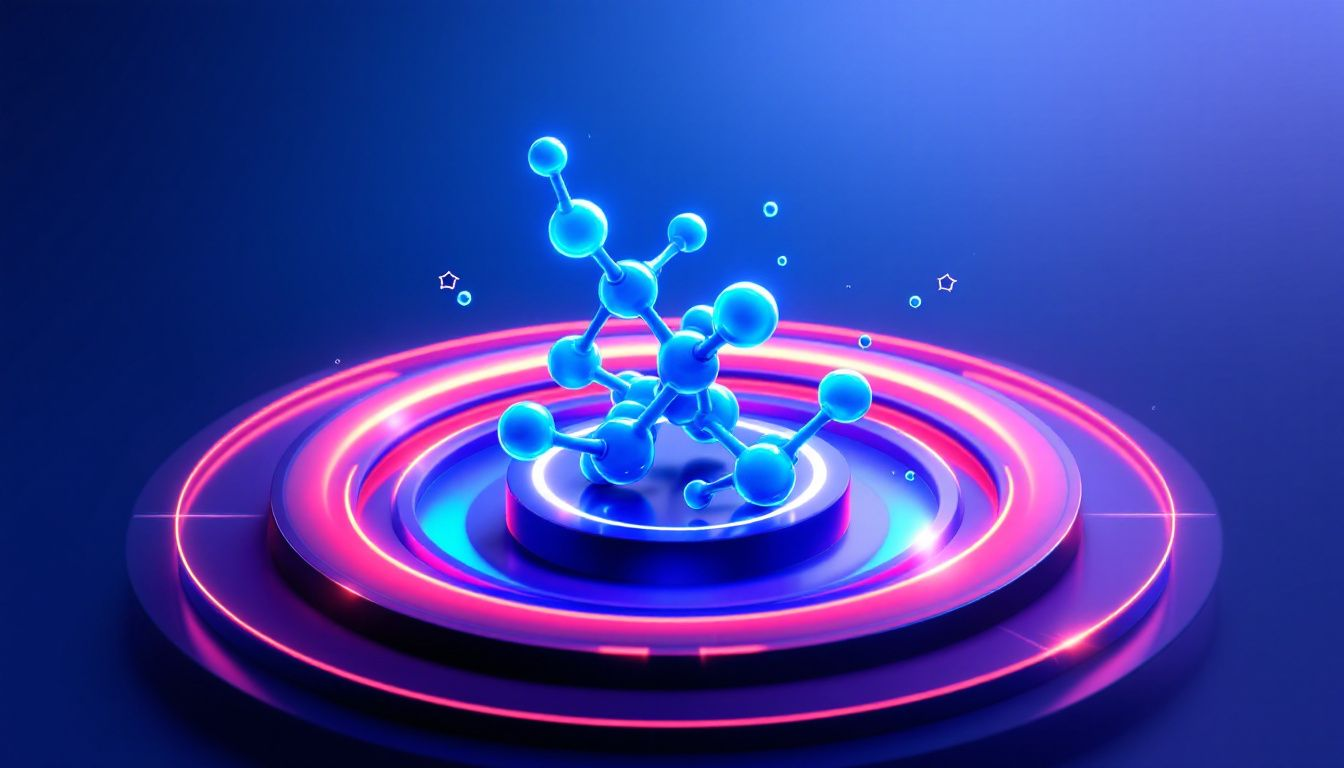
NAD+, or nicotinamide adenine dinucleotide nad, is a coenzyme that occurs naturally in the body and plays a pivotal role in muscle tone, cell growth, and damage repair. As a critical component in cellular energy functions, NAD+ is essential for energy metabolism, DNA repair, and cellular signaling. It is no exaggeration to say that without NAD+, our cells would struggle to survive.
However, as we age, NAD+ levels decline, leading to a reduction in metabolic energy production and an increase in signs of aging. This decline in NAD+ is linked to fatigue, reduced cellular function, and a slower repair process. Maintaining adequate NAD+ levels is crucial for regulating cellular metabolism and balancing energy within cells. This makes NAD+ not only a coenzyme but a guardian of our cellular health.
The production of NAD+ is vital for various biological functions. It generates new healthy cells, maintains their function, and facilitates DNA repair, which is key to combating the effects of aging. With such a significant role in our body’s fundamental processes, ensuring optimal NAD+ levels through therapies like NAD peptide therapy becomes essential for overall well-being.
The Science Behind NAD Peptide Therapy
Scientific advances have revealed that NAD+ levels tend to decline with age, impacting various age-related diseases. NAD+ supports metabolic reactions and regulates enzymes involved in cellular activity, making it indispensable for maintaining tissue health. It facilitates cellular communication and energy adaptation, crucial for sustaining healthy tissues.
NAD therapy aims to replenish these declining levels, thereby enhancing energy levels and supporting overall cellular function. Regular NAD therapy leverages NAD’s regenerative potential, helping to restore the body’s natural balance. Clinical trials have shown significant increases in NAD+ concentrations in participants receiving NAD therapy, underscoring its efficacy.
The ability of NAD+ to assist in DNA repair is particularly noteworthy. Replenishing NAD+ levels through NAD peptide therapy boosts energy and supports the body’s repair mechanisms, essential for longevity and health.
Key Benefits of NAD Peptide Therapy
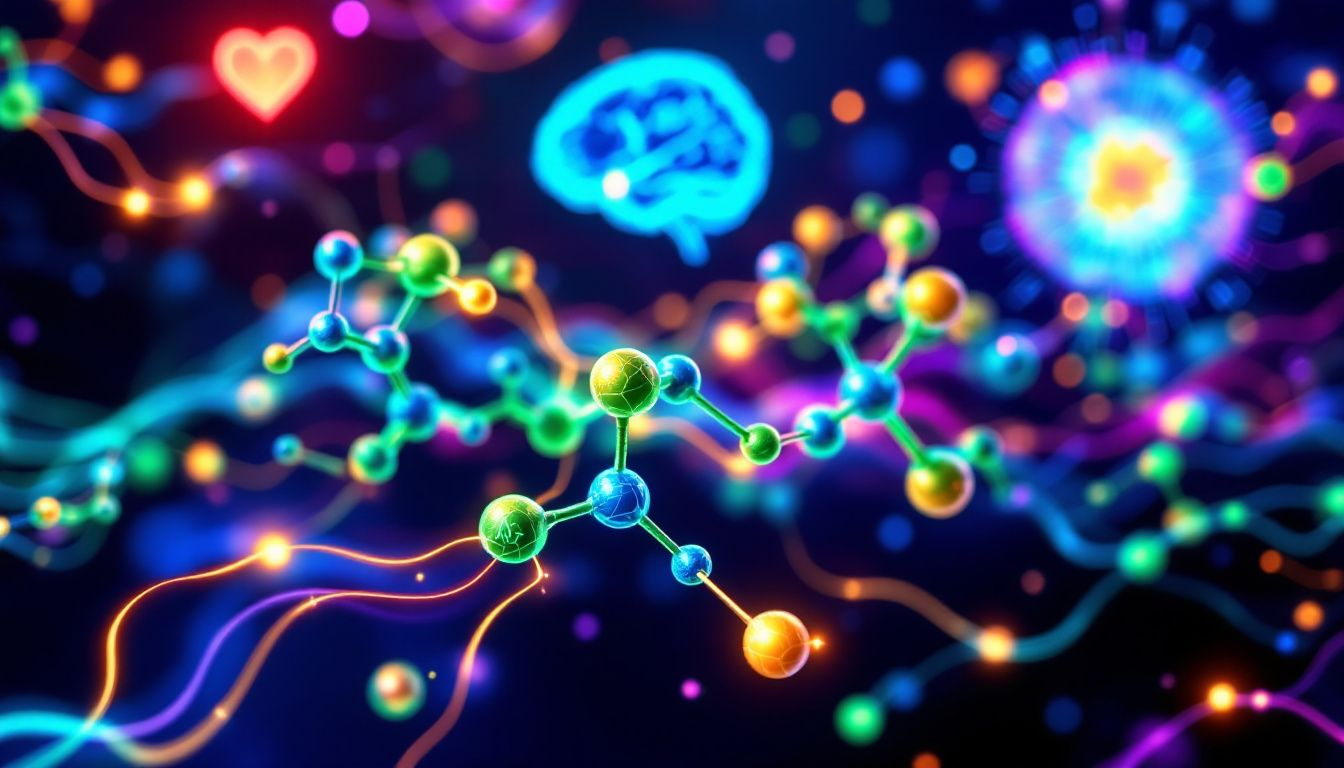
NAD peptide therapy offers a plethora of health benefits, making it a cornerstone of modern wellness practices. It significantly enhances energy levels, providing a much-needed boost for daily activities and overall vitality. One of the most remarkable benefits is its potential to slow the aging process by promoting better cellular function and regeneration.
NAD peptide therapy also enhances cognitive function, improving mental clarity and focus. It also plays a crucial role in muscle function, aiding in recovery and enhancing performance. These benefits collectively contribute to a more youthful and energetic lifestyle, making NAD peptide therapy a valuable tool for maintaining health and well-being.
Slows Aging Process
NAD therapy may alleviate the effects of age-related conditions by replenishing declining NAD levels, thus promoting cell rejuvenation. This rejuvenation process is crucial as it encourages cell function, the regeneration of new cells, and assists with DNA repair. These mechanisms are vital for maintaining a youthful appearance and delaying the onset of age-related decline.
The impact of NAD+ on the aging process cannot be overstated. Enhanced repair and regulatory processes through NAD peptide therapy can slow cellular aging and promote overall health. Animal studies have shown that NAD supplementation can prolong good health and reduce signs of premature aging, highlighting its potential in anti-aging therapies.
Many individuals have reported improvements in skin elasticity and overall vitality after undergoing NAD IV therapy aimed at anti-aging. These testimonials underscore the therapy’s effectiveness in promoting a youthful appearance and energy levels, making it a popular choice for those seeking to defy the aging process.
Enhances Cognitive Function
NAD therapy supports cognitive function by increasing the bioavailability of NAD to brain cells, which is essential for cell renewal and optimal function. Cognitive functions such as memory, focus, and mental clarity can significantly improve with NAD peptide therapy, making it a powerful tool for maintaining brain health.
Research indicates that NAD supplementation could potentially slow the progression of neurodegenerative diseases such as Alzheimer’s. Many individuals with neurological disorders have reported enhancements in cognitive function and motor skills after undergoing NAD IV therapy.
These improvements in mental clarity and energy levels are frequently reported by clients, highlighting the transformative potential of NAD therapy.
Supports Muscle Function
NAD+ supplementation may improve symptoms of age-related conditions and promote muscle recovery. Performance NAD+ IV Therapy can enhance athletic performance, boost muscle function, and repair and regenerate muscle tissue, making it a valuable asset for athletes and fitness enthusiasts.
NAD+ injections enhance muscle function and endurance, reduce recovery times, and support energy metabolism. Athletes often use NAD IV therapy to enhance their performance and recover more efficiently from workouts. This makes NAD peptide therapy an excellent choice for anyone looking to improve their exercise performance and overall muscle health.
Impact on Age-Related Diseases
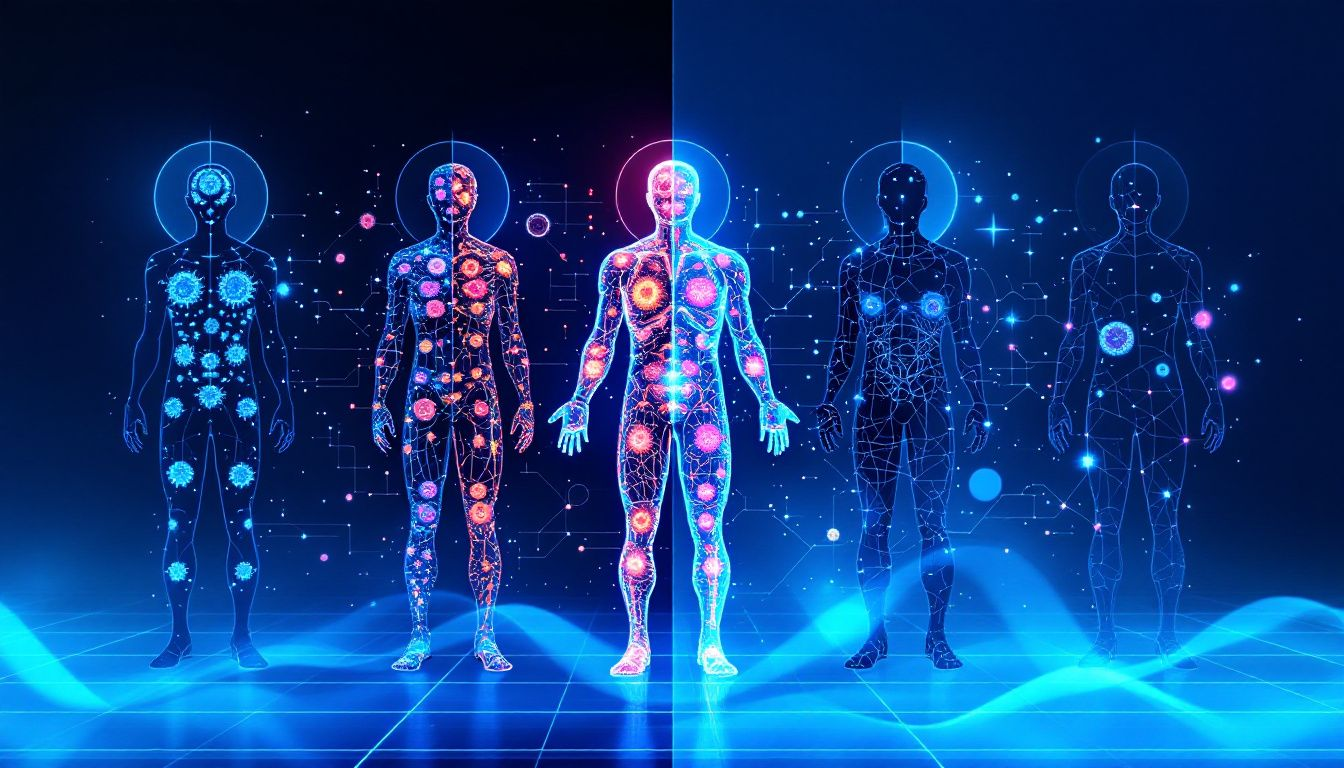
Imbalances in NAD+ levels are linked to various aging related diseases, including metabolic disorders and neurodegeneration. As we age, the decline in NAD+ levels contributes to signs of aging and a higher risk of developing these conditions. Restoring NAD+ levels has been linked to improved cardiovascular health and metabolic functions, making it a crucial element in combating age-related diseases.
Older adults might need larger doses of NAD to achieve similar effects as younger individuals. This is particularly important for those with specific health issues, such as neurodegenerative disorders, who may require increased NAD doses for significant improvements.
NAD+ injections can help manage chronic conditions and support overall cellular function, providing a comprehensive approach to healthy aging.
Heart Disease
NAD peptide therapy protects heart cells and maintains the elasticity of arteries, which decreases with age and can lead to increased blood pressure and cardiovascular disease. Enhancing artery flexibility through NAD therapy helps reduce cardiovascular risks and supports heart health.
Protecting heart cells and maintaining artery elasticity are crucial for preventing heart disease and supporting good health. NAD peptide therapy’s ability to improve blood pressure and cardiovascular function makes it an essential tool in the fight against heart disease.
Metabolic Health
NAD therapy can support metabolic functions and assist in weight management by enhancing the body’s ability to metabolize fat. It improves the regulation of blood sugar, insulin, and cholesterol levels, which are critical for maintaining metabolic health. NAD therapy’s ability to elevate NAD levels aids in fat metabolism and supports weight loss, potentially reducing the risk of fatty liver disease.
Research has shown improvements in insulin sensitivity with NAD supplementation, making it a valuable tool for managing conditions like diabetes and obesity. NAD therapy boosts ATP production, enhancing energy metabolism, muscle recovery, and endurance.
Neurodegenerative Disorders
NAD+ is crucial for maintaining optimal brain function and supports neuronal health. With aging, brain cells lose plasticity and resistance to neuronal stress, making NAD+ levels important for preventing age related brain diseases. Supplementing with NAD may reduce nerve cell inflammation linked to cognitive disorders.
Clinical trials have noted improvements in NAD levels and symptoms in individuals with Parkinson’s disease after high doses of a NAD precursor. NAD peptide therapy may also assist in managing depression and chronic pain, providing a comprehensive approach to brain health and overall well-being.
Administration Methods of NAD Peptides
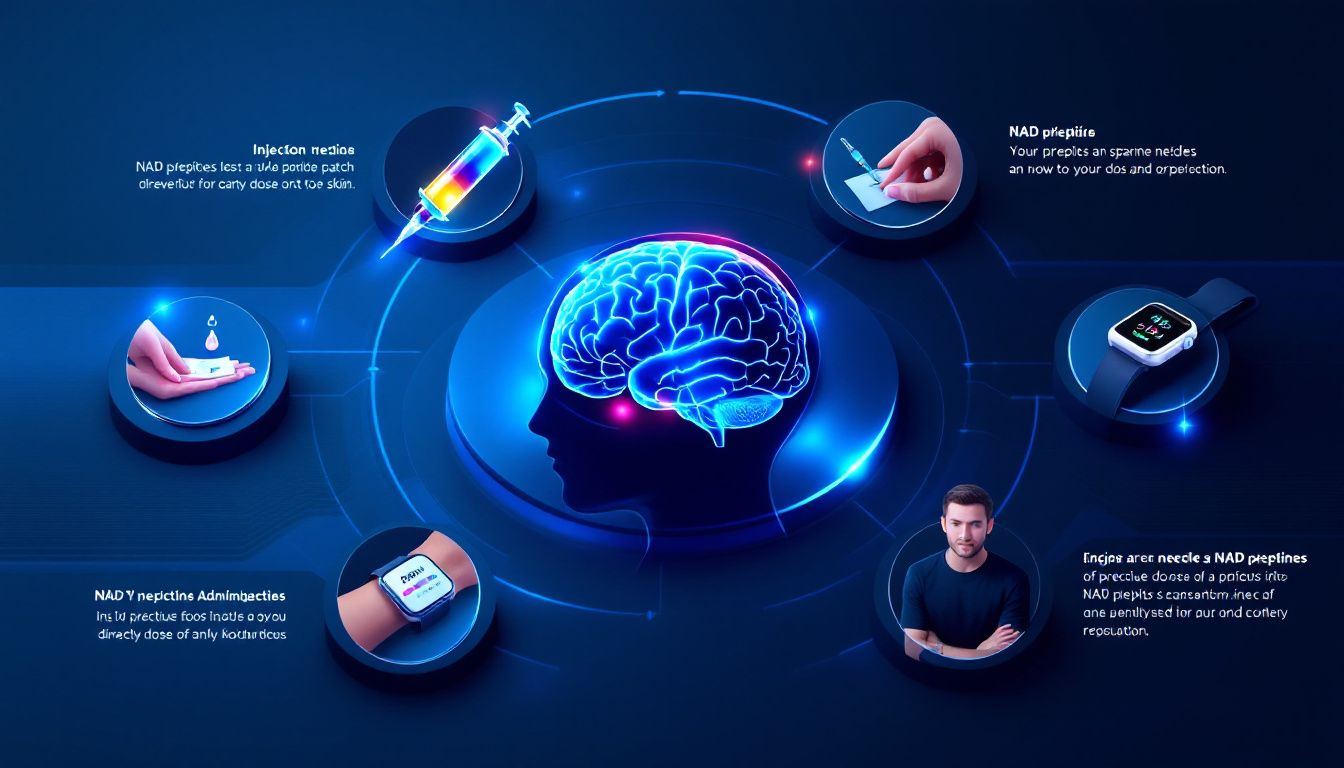
Several methods are available for NAD supplementation, each offering unique benefits. NAD+ injections can be administered subcutaneously (under the skin) or intramuscularly (into the muscle), providing different absorption rates and effects. NAD injections are a cost-effective alternative to more complex methods like IV therapy, yet they still deliver significant benefits.
The choice of administration method depends on individual needs and preferences. Subcutaneous injections offer a slower release of NAD+, providing prolonged effects, while intramuscular injections deliver immediate benefits. IV therapy, on the other hand, ensures rapid absorption and utilization by cells, leading to immediate energy boosts.
Subcutaneous Injections
Subcutaneous injections deliver NAD+ in a manner that can be beneficial for individuals looking for a gradual absorption rate. This method provides a slower release of NAD+ compared to intramuscular injections, allowing for prolonged effects and sustained energy levels.
The cost of treatment options for subcutaneous injections is relatively affordable, with a 500mg vial priced at $250 and a 1000mg vial at $450. This makes subcutaneous injections an accessible option for those seeking the benefits of NAD therapy.
Intramuscular Injections
Intramuscular injections of NAD+ deliver a higher volume directly into the muscle, allowing for more immediate effects compared to subcutaneous injections. This method can enhance metabolic processes and aid in generating energy at the cellular level.
Intramuscular NAD+ therapy can support recovery from injuries by promoting better healing through increased NAD levels. It may also play a role in addiction recovery by helping to heal the brain at a cellular level, making it a versatile option for various health needs.
IV Therapy
Intravenous delivery of NAD combined with IV fluids, known as IV NAD therapy, allows for higher absorption rates and immediate benefits. This method provides rapid absorption and utilization by cells, leading to immediate energy boosts and enhanced cellular function.
IV NAD therapy offers several types, such as Anti-aging NAD+ IV Therapy, NeuroRestore NAD+ IV Therapy, Performance NAD+ IV Therapy, and NeuroMax NAD+ IV Therapy, each tailored to specific health goals. IV administration bypasses the digestive tract, ensuring optimal bioavailability and quick results, making it a preferred choice for effective NAD replenishment.
Dosage Recommendations
Starting NAD infusion doses are generally around 500mg daily, often administered over multiple days. A prudent approach for those new to NAD+ injections is to begin with 500mg, gradually increasing based on individual needs and response. Popular dosages for at-home NAD+ injection kits include 500mg and 1,000mg, providing flexibility for different levels of supplementation.
The recommended dosage for NAD can differ based on the method of administration, with intravenous infusions typically requiring higher amounts. Consulting a healthcare provider is essential to determine the proper dosage and to avoid exceeding the recommended amounts, which could lead to unwanted side effects.
Safety and Side Effects
NAD IV therapy is generally well-tolerated, with no long-lasting side effects reported in studies. Common side effects of NAD IV therapy include flushing, nausea, and mild headaches, which are typically transient. NAD+ injections are considered safe when administered by trained professionals, though more research is needed on their long-term effects.
Before:
Potential side effects of NAD+ injections include:
-
redness
-
swelling
-
bruising at the injection site
-
nausea
-
fluctuations in blood pressure or heart rate
-
allergic reactions (though these are rare)
Consulting with a healthcare provider before undergoing NAD+ therapy is essential for ensuring safety and addressing any concerns.
Comparing NAD Peptide Therapy with Other NAD+ Supplements
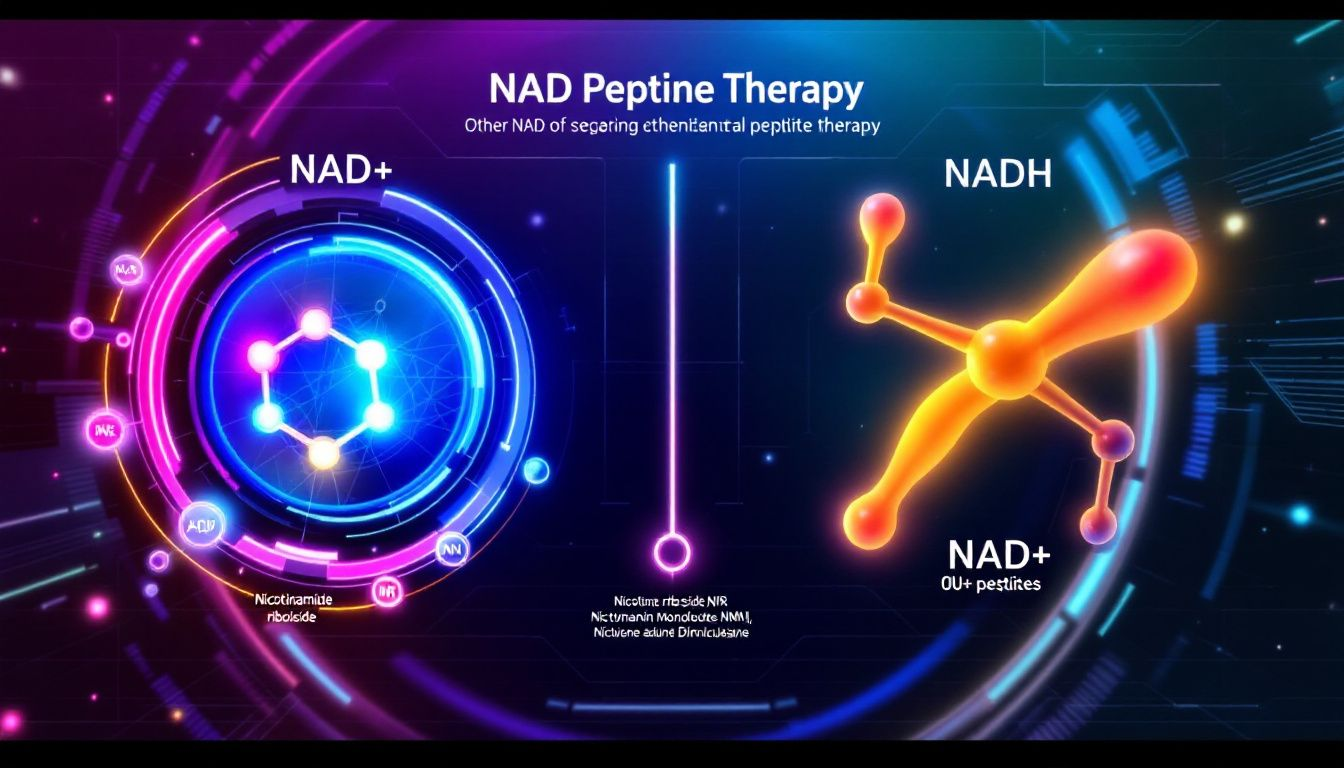
Different methods of NAD supplementation include intravenous, subcutaneous, oral, and topical applications. NAD+ injections can be administered quickly, typically requiring only 5 to 15 minutes for the procedure. NAD nasal spray allows for rapid absorption through the nasal passages, making it effective for quick cognitive and neurological benefits.
Oral NAD supplements, while convenient, typically have slower absorption rates and can yield inconsistent results due to digestive factors. Transdermal patches offer a non-invasive method but may have varying effectiveness depending on skin absorption rates. Each method has its pros and cons, and the choice of dietary supplement depends on individual preferences and health goals.
Personal Experiences and Testimonials
Individuals who undergo NAD peptide therapy typically report positive experiences and health improvements. Many share stories of increased energy levels, enhanced cognitive function, and overall better health, highlighting the transformative potential of NAD therapy.
While anecdotal evidence is compelling, it’s essential to consider the potential placebo effect when evaluating these testimonials. Ongoing research and future studies will provide deeper insights into the therapeutic potential of NAD+ in aging and age-related diseases.
Summary
NAD peptide therapy offers a promising approach to enhancing health and vitality by replenishing declining NAD+ levels. Its benefits range from slowing the aging process and improving cognitive and muscle functions to supporting metabolic health and managing age-related diseases. The various administration methods, including subcutaneous, intramuscular, and IV therapy, provide flexibility to suit different needs and preferences.
As we continue to explore the potential of NAD therapy, its role in promoting better health and longevity becomes increasingly evident. Embrace the possibilities that NAD peptide therapy offers, and take a step towards a healthier, more vibrant life.
Frequently Asked Questions
What are the potential side effects of NAD+ therapy?
NAD+ therapy may cause flushing, nausea, mild headaches, and localized redness or swelling at the injection site. These side effects are generally short-lived.
How does NAD therapy support cognitive function?
NAD therapy supports cognitive function by enhancing the availability of NAD to brain cells, which promotes cell renewal and may lead to improved memory, focus, and mental clarity. This therapeutic approach thus holds promise for enhancing overall cognitive health.
What are the benefits of IV NAD therapy compared to other methods?
IV NAD therapy provides rapid absorption and immediate benefits, ensuring optimal bioavailability by bypassing the digestive tract. This leads to quicker results compared to other methods.
Can NAD peptide therapy help with muscle recovery?
NAD+ peptide therapy can indeed aid in muscle recovery by enhancing muscle function and endurance, as well as reducing recovery times. This makes it particularly beneficial for athletes and individuals recovering from injuries.
Is NAD+ therapy safe for long-term use?
NAD+ therapy is generally regarded as safe when administered by trained professionals; however, further research is necessary to fully understand its long-term effects.


